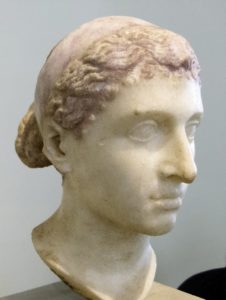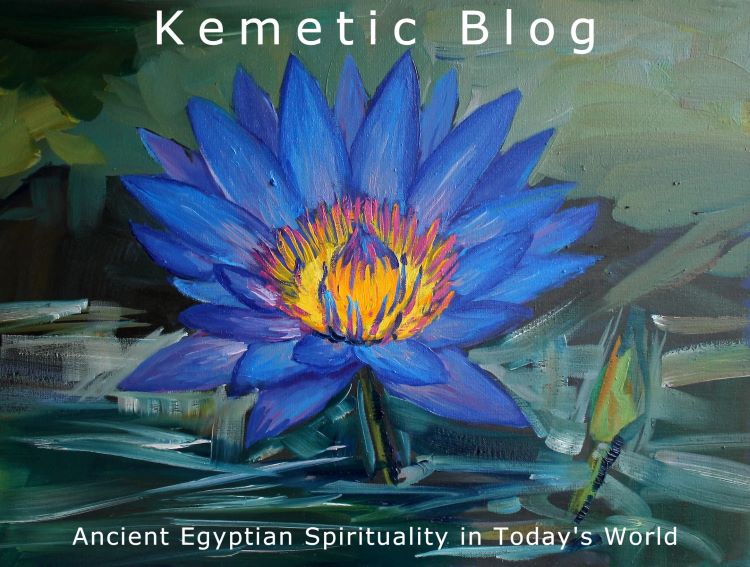
Accurate or not? Image by Louis Le Grand, now in the public domain via Wikipedia. Caption reads, “The Berlin Cleopatra, a Roman sculpture of Cleopatra wearing a royal diadem, mid-1st century BC (around the time of her visits to Rome in 46–44 BC), discovered in an Italian villa along the Via Appia and now located in the Altes Museum in Germany.”
Queen Cleopatra debuted a few months ago on Netflix and I’ll admit, I’ve been avoiding it. Not because of the controversy surrounding Queen Cleopatra VII’s genetic legacy but for more personal reasons. In truth, I’ve been avoiding Cleopatra the entire time I’ve been a Kemetic pagan and it has nothing to do with race. (If you landed here from a search engine or on social media, a Kemetic pagan is someone who works with or worships the old gods of ancient Egypt). In this series, I’ll discuss what I think the real issues are — and why we’re at virtual war with one another over Queen Cleopatra.
First, let me address the topic of race, since it’s the subject of heated debate and even a lawsuit from modern Egyptians, some of whom feel their national identity and history are under attack. These claims deserve to be recognised and respected with a certain degree of cultural sensitivity toward modern Egyptians, who are after all, the stewards of ancient Egypt.
On the other hand, I also feel like I need to state the obvious. Netflix’s depiction of Queen Cleopatra as a black woman is no more right or wrong than Hollywood depicting her as a white woman, which occurred sixty years ago. Adele James (who is mixed race) and Elizabeth Taylor (who was white) are simply actresses. Good actresses, I might add, but actresses none the less. No one seemed to raise a brow when Queen Cleopatra was portrayed by Elizabeth Taylor. Why, then all the fuss about Adele James? Because of historical inaccuracies on the part of African Queens producer, Jada Pinkett Smith or is it simply a case of racism?
Egyptologists and other academics have demonstrated that it is often our perceptions of ancient Egypt that dominate our modern narrative of it and not historical Egypt itself. In Egypt: A life before the afterlife, Richard Parkinson states, “Ancient Egypt rarely escapes our stereotypical view…” Nearly all of us have a somewhat skewed sense of perception when it comes to ancient Egypt, because we’re viewing it through our own lens.
The point I am asking non-black readers to consider is, if a historically inaccurate White Cleopatra is acceptable to us for the sake of re-enactment, then a Black Cleopatra should be as equally acceptable. If not, then we have to consider our own bias, our own prejudice and dare I say the uncomfortable truth again, our own racism. Alternatively, we can choose to be part of the healing and empowerment of a people who’ve been historically disadvantaged by colonialism and enslavement. We can approach the Afrocentric point of view with an open mind and a light heart, in the spirit of Ma’at (the ancient Egyptian philosophy of goodness and balance in the world, as opposed to chaos and isfet — evil). Eurocentric modes of thought are outdated and need to be challenged, need to be shaken up and they need to change. In short, we need to evolve.
As stated in Queen Cleopatra, we don’t know for certain the exact genetic make-up of Egypt’s last pharaoh, because we aren’t completely sure about who her mother was. Plus, it’s likely that Cleopatra’s remains were cremated by the Romans, meaning there’s probably no chance of genetic testing. We know her father was a Ptolemaic Greek with some Persian, while her mother’s identity remains unknown. That means, unless new evidence comes to light, Cleopatra’s likeness is open to interpretation. It may also suggest that Cleopatra’s race is not as vital to her story as we might think. The next logical step would be to look at what information is vital to the story of Queen Cleopatra.
This post will continue with part 2. Please subscribe for future updates. Whatever your point of view regarding Queen Cleopatra, I thank you for reading Kemetic Blog and invite you to share your feedback in the comment section below.

Acknowledgement of African Origin The author of Kemetic Blog acknowledges and respects the African ancestral origins of ancient Egypt and recognises the practice of Kemetic paganism as a modern reflection of Traditional African Religion.
©Scott Rose / Kemetic Blog – All Rights Reserved.

2 Comments
Scott Rose
August 19, 2023 at 11:34 amHere’s a backstory to this post you might find interesting. I’ve been on a practical placement for my degree while finishing up this post and have been staying in a Buddhist guesthouse in regional Queensland, Australia. It’s a quaint, and charming old place! In my room, there happens to be a touch lamp, which were quite popular in the 90’s and early 2000’s. I think I remember seeing one in my grandmother’s house many years ago. Anyway, as I was completing this post and getting ready to publish it, I thought to myself, “I want to push people [regarding their attitudes toward race] but I don’t want to push them too far.” At that thought, the touch lamp turned on by itself! Now, I’d been staying in this room for at least 10 days already and had no previous odd occurrences or malfunctions from the lamp. Since then, it’s turned on again while I was on a video call with my husband; it was in the morning, my curtains were open with natural light in the room and the lamp had been off, as I had no need for it. My husband didn’t see it happen, but he saw my amazement. As I write this comment, the lamp is behaving! Interesting coincidence, perhaps more, perhaps not. Who can say for sure?
A Kemetic Pagan’s Perspective on Queen Cleopatra Netflix Series Part 2
September 12, 2023 at 10:20 pm[…] part one I addressed the controversy surrounding Cleopatra’s race and our attitudes toward racism. […]